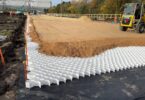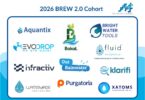- Water Futures project connects five European countries
- ERC Synergy will provide €10 million over a six-year period
- Four prominent scientists unite, linking hydroinformatics to economics.
A new European collaboration will find out how we can design urban drinking water systems fit for the future.
Linking the UK, the Netherlands, Germany, Greece and Cyprus, the six-year project will receive a total of €10 million through the European Research Council’s (ERC) Synergy Grant.
Entitled ‘Smart Water Futures: Designing the Next Generation of Urban Drinking Water Systems’, it will be led by a Water-Futures team that combines leading experience in water science, systems and control theory, economics and decision science, and machine learning.
Four prominent European scientists will oversee the Water-Futures initiative, including:
- Professor Dragan Savić, CEO of KWR Water Research Institute (KWR), the Netherlands and Professor of Hydroinformatics at the University of Exeter, UK
- Professor Barbara Hammer, Machine Learning Group at Bielefeld University, Germany
- Professor Phoebe Koundouri, Professor of Economics at the Athens University of Economics and Business, Greece
- Professor Marios Polycarpou, Director of the KIOS Research and Innovation Center of Excellence and Professor of Electrical and Computer Engineering at the University of Cyprus.
The research will seek to find out how the world can provide high-quality water in a future filled with uncertainty.
High levels of urbanisation – 70 per cent of the world’s population is expected to live in urban areas by 2050 – coupled with the impacts of climate change will accelerate the increase in water demand.
Professor Dragan Savić said: “Sustainable planning and management of water infrastructure are difficult or impossible to solve because of incomplete, contradictory, and changing requirements that are often difficult to recognise.”
The research will link short-term decisions to make water utility operations more efficient together with longer-term thinking to create resilient infrastructure for unpredictable environments.
An open-source toolbox will eventually help policymakers to better plan drinking water infrastructure.
Professor Phoebe Koundouri said: “We need a unifying framework for short and long-term decisions. This must integrate the correlation between time and uncertainty and be derived from a deeper understanding of the structure of human preferences.”
As water networks become more advanced with the integration of digital technologies, more data will be generated leading to large-scale, complex cyber-physical systems. The project will contribute to the design and operation of the next generation of smart water systems.
“Real-time monitoring and control will be integrated with long-term robustness and flexibility, while incorporating economic, social, ethical and environmental considerations,” said Professor Polycarpou.
Professor Barbara Hammer added: “We will face problems that will become moving targets due to changes in the environments and demand. We need to devise robust methods to deal with these uncertainties under continuous changes.”
Smart Water Futures will use a systems innovation approach to co-design future urban water systems by co-developing the necessary technological, policy and financial pathways.
Do you have an article or video that you would like to share? Submit your article here or keep up with the latest news from the water industry and wastewater industry by subscribing to our weekly newsletter







